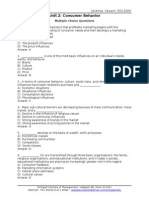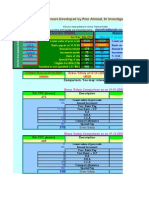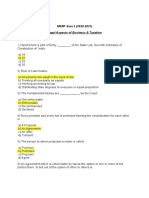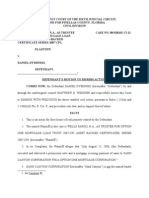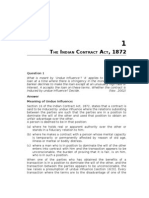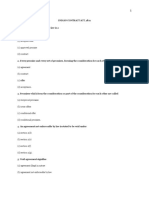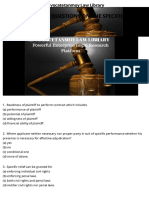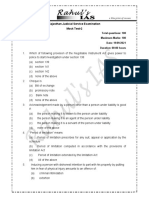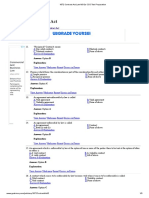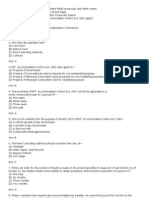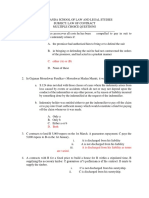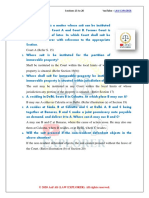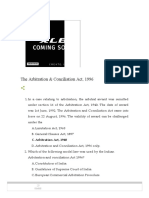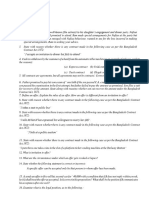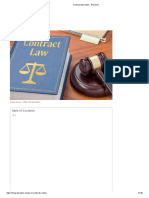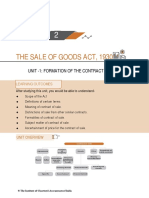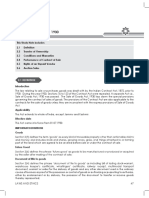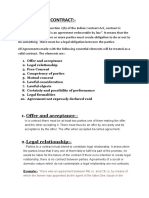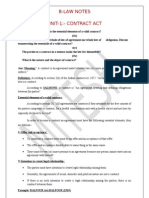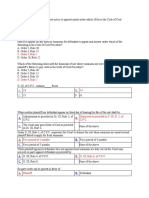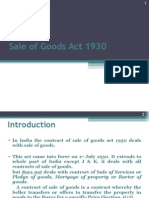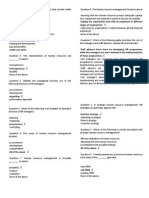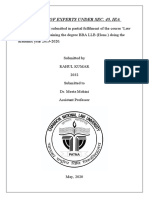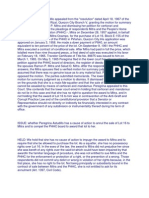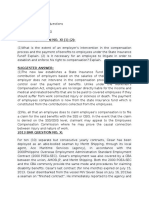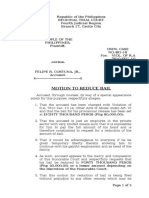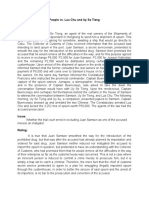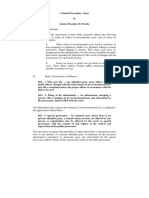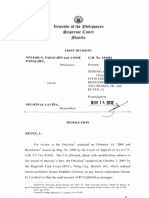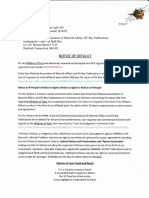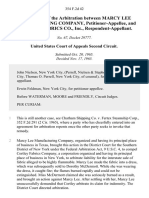0 ratings0% found this document useful (0 votes)
463 viewsSales of Goods Act 1930
Sales of Goods Act 1930
Uploaded by
Amol ChavanThe document contains 25 multiple choice questions about key concepts from the Sale of Goods Act 1930 in India. The Act governs contracts for the sale of goods and establishes rules regarding when ownership transfers, implied warranties, unpaid sellers' rights, and more. Some key points covered include when ownership transfers in a sales contract, buyers' and sellers' rights and liabilities, implied conditions regarding quality and fitness, and documents that constitute title of goods.
Copyright:
© All Rights Reserved
Available Formats
Download as DOCX, PDF, TXT or read online from Scribd
Sales of Goods Act 1930
Sales of Goods Act 1930
Uploaded by
Amol Chavan0 ratings0% found this document useful (0 votes)
463 views5 pagesThe document contains 25 multiple choice questions about key concepts from the Sale of Goods Act 1930 in India. The Act governs contracts for the sale of goods and establishes rules regarding when ownership transfers, implied warranties, unpaid sellers' rights, and more. Some key points covered include when ownership transfers in a sales contract, buyers' and sellers' rights and liabilities, implied conditions regarding quality and fitness, and documents that constitute title of goods.
Original Description:
Sales Of Goods Act 1930
Copyright
© © All Rights Reserved
Available Formats
DOCX, PDF, TXT or read online from Scribd
Share this document
Did you find this document useful?
Is this content inappropriate?
The document contains 25 multiple choice questions about key concepts from the Sale of Goods Act 1930 in India. The Act governs contracts for the sale of goods and establishes rules regarding when ownership transfers, implied warranties, unpaid sellers' rights, and more. Some key points covered include when ownership transfers in a sales contract, buyers' and sellers' rights and liabilities, implied conditions regarding quality and fitness, and documents that constitute title of goods.
Copyright:
© All Rights Reserved
Available Formats
Download as DOCX, PDF, TXT or read online from Scribd
Download as docx, pdf, or txt
0 ratings0% found this document useful (0 votes)
463 views5 pagesSales of Goods Act 1930
Sales of Goods Act 1930
Uploaded by
Amol ChavanThe document contains 25 multiple choice questions about key concepts from the Sale of Goods Act 1930 in India. The Act governs contracts for the sale of goods and establishes rules regarding when ownership transfers, implied warranties, unpaid sellers' rights, and more. Some key points covered include when ownership transfers in a sales contract, buyers' and sellers' rights and liabilities, implied conditions regarding quality and fitness, and documents that constitute title of goods.
Copyright:
© All Rights Reserved
Available Formats
Download as DOCX, PDF, TXT or read online from Scribd
Download as docx, pdf, or txt
You are on page 1of 5
At a glance
Powered by AI
The passage discusses important MCQ questions related to the Sale of Goods Act 1930. It covers topics like passing of property, documents of title, rights of unpaid sellers, implied conditions etc.
The Sale of Goods Act classifies existing goods as specified goods, ascertained goods and unascertained goods.
When the property in goods has not passed to the buyer, the unpaid seller has the right of withholding delivery and stoppage in transit.
[THE SALE OF GOODS ACT 1930] December 8, 2010
vxplain 2 score more-- post your doubts to us at vxplain@gmail.com Page 1
Important MCQs on Sale of goods Act
Q.1 The property in goods in a contract for sale of specific or ascertained goods, passes to the
Buyer when the
1. Contract is made
2. Parties intend the property in goods to pass
3. Price is paid
4. All of the above.
Q.2 When the terms of a contract of sale of goods are such that by reserving the right of disposal,
the Seller commits breach of the contract, and the goods are appropriated to the contract does not
cause the property in goods to pass to the Buyer. It is
1. Partly True
2. True
3. Partly False
4. False
Q.3 Where the buyer wrongfully refuses to accept delivery of the goods, the seller may recover
the damages
1. for the reasonable charges for the care and custody of the goods
2. for the loss caused by non-acceptance of the goods
3. either (a) or (b).
4. for both (a) and (b)
Q.4 According to Sale of Goods Act, 1930, 'Seller' means a person
1. Who only agrees to sell goods
2. Who only sells goods
3. Who sells or agrees to sell goods
4. None of the above
Q.5 Under the Sale of Goods Act, 1930 existing goods are classified as
1. Specified Goods
2. Ascertained Goods
3. Unascertained Goods
4. All of the above
[THE SALE OF GOODS ACT 1930] December 8, 2010
vxplain 2 score more-- post your doubts to us at vxplain@gmail.com Page 2
Q.6 In case of sale of goods
1. General property in the goods must be transferred to the buyer
2. Possession of goods must be transferred to the buyer
3. Special property in the goods must be transferred to the buyer
4. Both (1) and (2)
Q.7 "Contract of Sale' under Section 4 of the Sale of Goods Act, 1930 comprises of contracts
which are
1. Executory
2. Concluded
3. Both executory and executed
4. Executed
Q.8 Following is not the document of title
1. railway receipt
2. bill of lading
3. dock warrant
4. none of the above
Q.9 When seller exercises right of lien or right of stoppage of goods in transit and gives notice to
buyer for payment and buyer done not pay or tender within reasonable
time an Un paid seller can
1. re-sale the goods
2. cannot resale the goods
3. ask again to buyer
4. take possession and mark good as bad
Q.10 In a contract of sale of goods, the implied condition as to wholesomeness applies to
1. medicines
2. eatables
3. cloths
4. computers
[THE SALE OF GOODS ACT 1930] December 8, 2010
vxplain 2 score more-- post your doubts to us at vxplain@gmail.com Page 3
Q.11 X agrees to supply to Y a certain quantity of timber of half-inch thickness. The timber
actually supplied varies in thickness from one third inch to five-eight inch. The timber is
merchantable and commercially fit for the purpose for which it was ordered. B rejects the timber.
Is his action justified ?
1. Yes, Y is entitled to reject the goods
2. No, Y is not entitled to reject the goods
3. Y can claim the damages if purpose is not solved after using the timber
4. X can ask for the difference amount
Q.12 Implied condition as to quality or fitness does not apply if
1. Buyer discloses to the seller, the exact purpose for which goods are to be bought
2. Buyer indicates to the Seller that the relies on the seller's skill
3. Seller deals in such goods
4. Buyer reserves the right to examine the goods and check its quality
Q.13 When goods are sent on 'sale or return basis' i.e., on approval to a buyer, the property in the
goods passes
1. When the buyer signifies his approval
2. When the buyer pledges the goods without signifying approval
3. When the buyer retains the goods after the expiry of time fixed or reasonable time to return the
goods
4. When any of the above stated situations emerges
Q 14 The consideration in a contract of sale is called
1. Price
2. Exchange money
3. Barter money
4. Reward
Q.15 Under Sec.19 of the Sale of Goods Act, 1930, the property in goods passes to the buyer
1. When the contract is made
2. When the payment of price is made
3. on delivery of goods
4. When the parties intend the property in goods to pass
[THE SALE OF GOODS ACT 1930] December 8, 2010
vxplain 2 score more-- post your doubts to us at vxplain@gmail.com Page 4
Q.16 According to Sec. 15 of the Sale of Goods Act 1930, the implied condition is that the goods
shall correspond with
1. Description
2. The sample
3. Either sample or description.
4. Both sample and description
Q.17 as per Sale of Goods Act, a condition is a stipulation
1. Breach of which gives rise to a right to repudiate the contract
2. Which is collateral to the main purpose of the contract?
3. Which is essential for the main purpose of contract?
4. Both (1) and (3)
Q. 18 .............................conditions and warranties are those which have expressly agreed upon
by the parties at the time of the contract of sale and are expressly provided in the contract.
1. Express
2. Implied
3. Payment
4. Terms
Q.19 when a breach of a condition is treated as a breach of a warranty, the buyer can-
1. Repudiate the contract
2. Reject the goods
3. Claim damages
4. None of the above
Q.20 Delivery of goods to is deemed to be the delivery of goods if the seller does
not reserve the right of disposal of the goods.
1. Carrier
2. Third party
3. Carrier or wharfinger
4. wharfinger
[THE SALE OF GOODS ACT 1930] December 8, 2010
vxplain 2 score more-- post your doubts to us at vxplain@gmail.com Page 5
Q21.When an unpaid seller, who has exercised his right of lien or stoppage in transit, resells the
goods, the buyer
1. The buyer does not acquires a good title to the goods as against the original buyer
2. The seller does not have a right to sell
3. The buyer acquires a good title to the goods as against the original buyer
4. None of the above
Q. 22 When property in goods has not passed to the buyer, the unpaid seller has a right of
1. Withholding delivery
2. Stoppage in transit
3. (1) and (2)
4. (1) or (2)
Q.23 the intention of the parties to transfer the property in goods from the seller to the buyer can
be inferred from the
1. Terms of the contract
2. Conduct of the parties
3. Circumstances of the case
4. All the above
Q.24 The Seller of Goods is deemed to be an Unpaid Seller when the........ Of the price has not
been paid or tendered.
1. Whole
2. Part
3. Substantial portion
4. Minimal portion
Q.25 In the case of ..........., the sale may be notified to be subject to a reserve or upset price.
1. Sale by description
2. Sale by auction
3. Sale by sample
4. Sale by estoppel
You might also like
- Consumer Behavior MCQDocument10 pagesConsumer Behavior MCQAmol Chavan78% (18)
- 201-Marketing Management MCQDocument4 pages201-Marketing Management MCQAmol Chavan90% (10)
- 6th Central Pay Commission Salary CalculatorDocument15 pages6th Central Pay Commission Salary Calculatorrakhonde100% (436)
- 6th Central Pay Commission Salary CalculatorDocument15 pages6th Central Pay Commission Salary Calculatorrakhonde100% (436)
- The Indian Contract Act (Autorecovered)Document28 pagesThe Indian Contract Act (Autorecovered)Rahul Rahul AhirNo ratings yet
- Question Bank With AnswersDocument23 pagesQuestion Bank With AnswersHarleen KohliNo ratings yet
- Motion To Dismiss - AllongeDocument14 pagesMotion To Dismiss - Allongewinstons2311100% (8)
- SAFE - Welton Arrest WarrantDocument11 pagesSAFE - Welton Arrest Warrantrj3301aNo ratings yet
- Contract Drafting IlpdDocument128 pagesContract Drafting IlpdsamuelNo ratings yet
- Saleofgoodsact MCQDocument5 pagesSaleofgoodsact MCQashwani1883No ratings yet
- Chapter-1 The Indian Contract Act, 1872Document31 pagesChapter-1 The Indian Contract Act, 1872Anand_Agrawal19100% (1)
- Family Law 150 MCQDocument21 pagesFamily Law 150 MCQsimran pathanNo ratings yet
- JCJ Model PapersDocument119 pagesJCJ Model PapersKumaraSwamyNo ratings yet
- Mcqs On Transfer of Property Act (With Answers)Document24 pagesMcqs On Transfer of Property Act (With Answers)rabbani bagwanNo ratings yet
- Sale of Goods Act-MCQDocument5 pagesSale of Goods Act-MCQSunita Singhal0% (1)
- Soga 3Document41 pagesSoga 3Pooja TripathiNo ratings yet
- Operations Research MCQ PDFDocument17 pagesOperations Research MCQ PDFDipak Mahalik100% (1)
- OBJECTIVE SAMPLE QUESTIONS ON THE SPECIFIC RELIEF ACT (1ST SET) - Advocatetanmoy Law LibraryDocument17 pagesOBJECTIVE SAMPLE QUESTIONS ON THE SPECIFIC RELIEF ACT (1ST SET) - Advocatetanmoy Law LibraryAdv Sandeep Singh100% (1)
- IBPS Law Officer Study Material Company Law MCQDocument31 pagesIBPS Law Officer Study Material Company Law MCQRohanPuthalathNo ratings yet
- Partnership ActDocument34 pagesPartnership ActMadhaan Aadhvick100% (3)
- Special Contract ActDocument45 pagesSpecial Contract ActRohit Kalia67% (6)
- Law of Contract II - MCQDocument31 pagesLaw of Contract II - MCQDinesh GadkariNo ratings yet
- MCQ'S (Multiple Choice Questions)Document19 pagesMCQ'S (Multiple Choice Questions)Shubham SinghNo ratings yet
- Sample Questions On The Indian Evidence ActDocument26 pagesSample Questions On The Indian Evidence ActDevagya JhaNo ratings yet
- Contract MCQ EnglishDocument70 pagesContract MCQ EnglishUmakanta ballNo ratings yet
- Sample MCQ II On Negotiable Instruments ActDocument5 pagesSample MCQ II On Negotiable Instruments ActLokesh RathiNo ratings yet
- MCQ Family LLBDocument15 pagesMCQ Family LLBSanjay TiwariNo ratings yet
- Ahul's: Total Questions: 100 Maximum Marks: 100 Date: 19/09/2021 Duration: 00:00 HoursDocument19 pagesAhul's: Total Questions: 100 Maximum Marks: 100 Date: 19/09/2021 Duration: 00:00 HoursNarendra Nath DeoraNo ratings yet
- Contract 1 MCQ WordDocument9 pagesContract 1 MCQ WordASHISH CHETTRINo ratings yet
- 1872 Contract Act Law MCQs CSS Test Preparation 11 To 20Document3 pages1872 Contract Act Law MCQs CSS Test Preparation 11 To 20moin sayyedNo ratings yet
- Top 25 Mcqs On Banking Laws 1933a559Document29 pagesTop 25 Mcqs On Banking Laws 1933a559Hitesh Gagnani100% (1)
- MCQs On Indian Partnership Act, 1932 Part 1Document11 pagesMCQs On Indian Partnership Act, 1932 Part 1Piyush KandoiNo ratings yet
- MP1Document7 pagesMP1neerajsaraf121No ratings yet
- Law of Contract II - MCQDocument31 pagesLaw of Contract II - MCQDinesh GadkariNo ratings yet
- MCQs On Contract IIDocument26 pagesMCQs On Contract IINeha Sharma100% (1)
- Specific Relief Act MCQDocument14 pagesSpecific Relief Act MCQbhagathi nageswara raoNo ratings yet
- Indian Contract Act 1872Document31 pagesIndian Contract Act 1872MITRA SIMRAN ANEEL 2010331No ratings yet
- One Liners - CPC (Section 15 To 20)Document1 pageOne Liners - CPC (Section 15 To 20)Prince RajNo ratings yet
- Arbitration MCQ Judiciary ExamsDocument51 pagesArbitration MCQ Judiciary ExamsSamirkumar P. LakhtariaNo ratings yet
- Transfer of Property - MCQDocument15 pagesTransfer of Property - MCQMansi DabasNo ratings yet
- Sample I MCQs On Negotiable Instruments ActDocument2 pagesSample I MCQs On Negotiable Instruments ActLokesh RathiNo ratings yet
- CS CA Foundation MCQ Contract Act Part 1Document3 pagesCS CA Foundation MCQ Contract Act Part 1Sunita Singhal100% (1)
- Assignment On Business LawDocument6 pagesAssignment On Business LawmitemktNo ratings yet
- Contract Law Notes - IPleadersDocument140 pagesContract Law Notes - IPleadersACAD OBSERVER3 CHANDU SIRNo ratings yet
- Sale of Goods ActDocument52 pagesSale of Goods ActSiddharth ChaudharyNo ratings yet
- MCQ - Law of Contract IDocument38 pagesMCQ - Law of Contract IAishwarya100% (5)
- MCQ's On Business LawDocument106 pagesMCQ's On Business LawAjay SavkareNo ratings yet
- The Sale of Goods Act, 1930 The Sale of Goods Act, 1930Document17 pagesThe Sale of Goods Act, 1930 The Sale of Goods Act, 1930Zainab UnnisaNo ratings yet
- Company Law Question BankDocument6 pagesCompany Law Question BankJanet GawareNo ratings yet
- Indian Evidence Act Solved MCQs (Set-2)Document8 pagesIndian Evidence Act Solved MCQs (Set-2)Kailash KhaliNo ratings yet
- Ibc - Question Bank DTQ AnsDocument31 pagesIbc - Question Bank DTQ AnsShekhar PanseNo ratings yet
- Saurashtra University, Rajkot Second LL.B. MCQ - Bank JurisprudenceDocument15 pagesSaurashtra University, Rajkot Second LL.B. MCQ - Bank JurisprudenceDheerajNo ratings yet
- CPC 230 MCQsDocument61 pagesCPC 230 MCQsLegal VictorNo ratings yet
- Nov 2020Document26 pagesNov 2020Rahhul RajhansNo ratings yet
- MCQ - CPC ReseachDocument50 pagesMCQ - CPC ReseachSushil BaranwalNo ratings yet
- Marathon Notes of SOGA, LLP (Inc. Mind Maps and Section Revision)Document442 pagesMarathon Notes of SOGA, LLP (Inc. Mind Maps and Section Revision)RGNNishant BhatiXIIENo ratings yet
- Commercial Law CMA Inter (100 MCQS)Document13 pagesCommercial Law CMA Inter (100 MCQS)Abhijit Horo100% (2)
- Specific Relief ActDocument42 pagesSpecific Relief ActLavinaNo ratings yet
- Sales of Goods ActDocument17 pagesSales of Goods ActEshaan ChadhaNo ratings yet
- Definition of ContractDocument6 pagesDefinition of Contractanshika agarwalNo ratings yet
- Unit 2 Study MaterialDocument23 pagesUnit 2 Study MaterialPoorna PrakashNo ratings yet
- B.law Unit - IDocument43 pagesB.law Unit - IMITESHKADAKIA100% (2)
- Indian Evidence Act Solved MCQs (Set-10)Document8 pagesIndian Evidence Act Solved MCQs (Set-10)Kailash KhaliNo ratings yet
- CPC MCQ QuestionDocument2 pagesCPC MCQ QuestionTim TimNo ratings yet
- 003 Chapter Three Trade 2Document14 pages003 Chapter Three Trade 2Annette FlemingNo ratings yet
- Law of Sales of Goods - 1930Document44 pagesLaw of Sales of Goods - 1930mukesharora09No ratings yet
- The Sales of Goods ActsDocument7 pagesThe Sales of Goods Actsrajkhansir11No ratings yet
- 203 - HRM MCQDocument8 pages203 - HRM MCQAmol Chavan100% (1)
- 202-Finance Mamagement MCQDocument11 pages202-Finance Mamagement MCQAmol Chavan100% (1)
- 002 Preliminary Title Fuentes vs. Roca, G.R. No. 178902Document3 pages002 Preliminary Title Fuentes vs. Roca, G.R. No. 178902keith105No ratings yet
- Rule 3 Civil ProcedureDocument8 pagesRule 3 Civil Procedurececil fabroNo ratings yet
- Faqs For Refugees and Asylum-SeekersDocument6 pagesFaqs For Refugees and Asylum-SeekersIMUNISASI DINKESNo ratings yet
- 1989 Rules On Evidence 2019 Amendments RULE 128 General ProvisionsDocument27 pages1989 Rules On Evidence 2019 Amendments RULE 128 General ProvisionsChiic-chiic SalamidaNo ratings yet
- Expert Opinion Sec45 IeaDocument24 pagesExpert Opinion Sec45 IeaRahulKumar0% (1)
- The Representation of The People Act: Part IIDocument6 pagesThe Representation of The People Act: Part IIVishal yadavNo ratings yet
- Astudillo Vs Board of DirectorsDocument2 pagesAstudillo Vs Board of DirectorsRyan Ador Dionisio CastilloNo ratings yet
- 1968 Newspaper ClippingsDocument13 pages1968 Newspaper ClippingsMichael SmithNo ratings yet
- 1995 Bar No - XiDocument3 pages1995 Bar No - Xipoiuytrewq9115No ratings yet
- Marriage LicenseDocument2 pagesMarriage LicenseZhelNo ratings yet
- Construction and The Legal SystemDocument12 pagesConstruction and The Legal SystemHazid HarunNo ratings yet
- First Division (G.R. NO. 149152: February 2, 2007) Rufino S. Mamangun, Petitioner, V. People of THE PHILIPPINES, Respondent. Decision Garcia, J.Document6 pagesFirst Division (G.R. NO. 149152: February 2, 2007) Rufino S. Mamangun, Petitioner, V. People of THE PHILIPPINES, Respondent. Decision Garcia, J.Anne GeliqueNo ratings yet
- Volume 1 Navajo CodeDocument1,140 pagesVolume 1 Navajo Codeansari187No ratings yet
- Motion For ContinuanceDocument3 pagesMotion For ContinuanceCoy Resurreccion CamarseNo ratings yet
- Northwest Airlines Inc. v. Del - RosarioDocument6 pagesNorthwest Airlines Inc. v. Del - RosarioMonica FerilNo ratings yet
- Garcia Vs CA 167 SCRA 815Document7 pagesGarcia Vs CA 167 SCRA 815JamesAnthonyNo ratings yet
- MPID Act Rana Case Judgment Nagpur Bench PDFDocument26 pagesMPID Act Rana Case Judgment Nagpur Bench PDFAnand BhautikNo ratings yet
- People vs. Lua Chu and Uy Se Tieng FactsDocument1 pagePeople vs. Lua Chu and Uy Se Tieng FactsSDN HelplineNo ratings yet
- 3rd Session - Criminal Procedure - Justice Diosdado M. PeraltaDocument10 pages3rd Session - Criminal Procedure - Justice Diosdado M. PeraltaBonito Bulan100% (1)
- 78 Padalhin Vs LavinaDocument15 pages78 Padalhin Vs LavinaGlomarie GonayonNo ratings yet
- Notice of Default To RV Bey - 20170603 - 0001Document7 pagesNotice of Default To RV Bey - 20170603 - 0001PriyaSiranEL100% (2)
- AppauditDocument2 pagesAppauditPrerana ShahNo ratings yet
- ILODocument8 pagesILOJuliet MikeNo ratings yet
- Florida Bar Complaint: Counterclaim and Demand For Trial by JuryDocument49 pagesFlorida Bar Complaint: Counterclaim and Demand For Trial by JuryJudicial_FraudNo ratings yet
- I-589 InstructionsDocument14 pagesI-589 InstructionsReading_EagleNo ratings yet
- In The Matter of The Arbitration Between Marcy Lee Manufacturing Company, and Cortley Fabrics Co., Inc., 354 F.2d 42, 2d Cir. (1965)Document2 pagesIn The Matter of The Arbitration Between Marcy Lee Manufacturing Company, and Cortley Fabrics Co., Inc., 354 F.2d 42, 2d Cir. (1965)Scribd Government DocsNo ratings yet
- Solemnization of Marriage of ChrisitansDocument3 pagesSolemnization of Marriage of ChrisitansNaing AungNo ratings yet
